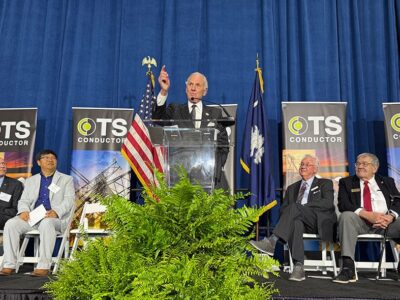The environmental movement requires innovation in numerous areas, including developing new and sustainable alternatives to materials that have been used for decades and continue to serve a significant role in the modern economy. An example is Styrofoam, the lightweight, water-resistant, and petroleum-based product invented in 1941 and still prevalent in packaging, coffee cups, building insulation, and other end markets.
Styrofoam is the catch-all phrase used to describe many polystyrene (PS) foam products. These products have many important commercial uses but are not necessarily eco-friendly. Polystyrene is derived from fossil fuels, and the production process relies heavily on carbon emissions. While the material is technically recyclable, many government recycling programs don’t accept it.
This point is where innovation plays a key role. In the polystyrene market, one innovation is expanded polystyrene (EPS), which the Treehugger website refers to as “the white stuff that coffee cups are made of.” Among the advantages of EPS over regular polystyrene are that it mainly comprises of air, requires fewer emissions to produce, and is easier to recycle.

Photo Courtesy Geofoam International LLC
In addition, EPS is “made up of organic elements” and “doesn’t contain toxic chemicals like chlorofluorocarbons (CFCs) or hydrochlorofluorocarbons (HCFCs),” according to Geofoam International LLC, a San Diego-based distributor of EPS block for use in construction applications.
Although expanded polystyrene has its critics in the environmental community, it is seen as a better alternative to traditional Styrofoam. Even sustainability advocates like Treehugger concede that EPS is the “most benign” form of polystyrene foam and is “beloved by Passivhaus architects” specializing in energy-efficient buildings.
One organization that aims to spread the word about the environmental advantages of expanded polystyrene is the EPS Industry Alliance (EPS-IA), a Crofton, Maryland-based trade association comprised of more than 70 small businesses in 44 states. Its members manufacture EPS foam insulation used in building and construction and EPS protective packaging for consumer goods.
In November 2023, the alliance announced that the EPS industry has “collectively invested” more than $185 million in technologies to integrate recycled content from used EPS packaging into various applications. According to a press release, about 79 million pounds of capacity are already operational, and an additional 150 million pounds are planned. The technology enables the production of recycled content resin, which can be used to manufacture new materials.

Photo Courtesy EPS Industry Alliance
Betsy Bowers, executive director of EPS-IA, told The Business Download that the “first step” of the recycling program is completed, including trials and implementation plans to incorporate recycled content in key packaging applications.
“Adoption by original equipment and product manufacturers will be key,” Bowers said in an email exchange. “We further want to identify similar developments in other global regions since expanded polystyrene is an essential packaging material in global distribution streams.”
In addition to bolstering the recycling uses of expanded polystyrene, Bowers said EPS manufacturers are also “implementing green manufacturing practices,” including air emissions abatement, solar energy, and water recycling. However, waste recycling remains a major focus.

Photo Courtesy EPS Recycling and Sustainability
“The EPS industry is actively engaged in collection efforts in their communities and have established solid end-use markets for EPS recyclate,” Bowers said. “We also work closely with major manufacturers and distributors to recapture waste EPS.”
Following the technology investment announcement, Bowers attended a meeting of the UN Environment Programme’s (UNEP) Intergovernmental Negotiating Committee (INC) at UNEP Headquarters in Nairobi, Kenya. The INC has been a driving force behind a March 2022 UN resolution to develop an international, legally binding treaty on plastic pollution.
“The treaty is an important opportunity to address plastic pollution from a clean slate perspective and to take a novel approach to problem-solving,” Bowers said. “However, ambitious goals must be balanced with the reality of implementation challenges. EPS packaging plays an important role in global distribution of essential goods, and we hope to see the treaty deliver new solutions and to harmonize policies that we see are already working.”

Photo Courtesy EPS Recycling and Sustainability
While the EPS industry supports reuse and recycling policy measures, it also “cautions that these are not one-size-fits-all,” according to Bowers. “For example, different countries might have different waste management capabilities or be at various stages of product development to create a more circular economy.”
“In some regions or countries, landfill bans may be a good solution, but feasibility studies must be conducted to affirm potential effectiveness,” Bowers said. “The plastic pollution treaty should [also] incorporate policy solutions that encompass both commercial and residential waste streams.”





